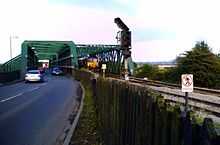Keadby Bridge
| Keadby Bridge | |
|---|---|
 Keadby Bridge | |
| Coordinates | 53°35′09″N 0°43′52″W / 53.5857°N 0.7311°WCoordinates: 53°35′09″N 0°43′52″W / 53.5857°N 0.7311°W |
| Crosses | River Trent |
| Other name(s) | King George V Bridge |
| Heritage status | Grade II listed structure |
| Characteristics | |
| Total length | 548 feet (167 m) |
| Longest span | 150 feet (46 m) |
| History | |
| Opened | 1916 |
Keadby Bridge, more formally known as the King George V Bridge, crosses the River Trent near Althorpe and Keadby in Lincolnshire, England.
History
The King George V bridge was opened by King George V, the chairman of the railway company and Lindsey County Council on 21 May 1916
This Scherzer rolling lift bridge carries both road and rail traffic across the River Trent. It was built between 1912 and 1916 by the Great Central Railway to replace a previous swing bridge built by the South Yorkshire Railway in 1866. It carries a double track railway line on the southern side, and the two-lane, single carriageway A18 road on the north side.

Its 50 metre (163ft) electrically powered bascule (lifting span) was one of the first of its type in Britain and when built, was the largest in Europe. Designed by James Ball and C A Rowlandson and built by contractors Sir William Arrol & Co. it has three main spans and two approach spans. The eastern main span was the one that lifted. The Scherzer bascule rolled and rotated on counterbalance. It was electrically powered, originally by a large storage battery fed by petrol-driven generators housed in the engine room beneath the east approach span.[1] This was later modified to mains electricity.
The bridge has not been lifted since 1956. The bridge was widened and the headroom increased in 1960 and the bascule was fixed in position.[2]
| Next crossing upstream | River Trent | Next crossing downstream |
| M180 motorway | Keadby Bridge Grid reference: SE840106 |
None |